Young African Leaders Leave Lasting Impact on MSU and Local Communities
- Salah Hassan, Ph.D.
- Professor, Department of English
- Director, Global Studies in the Arts and Humanities
- College of Arts and Letters
Project Overview
- For three years, MSU has hosted young African leaders as part of the Mandela Washington Fellowship program.
- The program provides six weeks of intensive programming to expand the fellows’ knowledge of U.S. models of civic engagement and strengthen their leadership skills.
Products/Outcomes
- MSU’s Leadership Institute team coordinated with local organizations to provide learning opportunities that can be translated from one community to another, encouraging people from different backgrounds to work together toward a common goal.
- Fellows volunteer at local organizations, contributing to the global perspective of what community service means.
- Long-lasting professional and personal relationships are formed, sustaining MSU’s connections with young scholars in Africa.
Partners
- Allen Neighborhood Center
- Alliance for African Partnership
- Global Studies in the Arts and Humanities
- International Research and Exchanges Board (IREX)
- Justice League of Lansing
- Mandela Washington Fellowship for Young African Leaders
- MSU Leadership Institute Staff
- Peckham
- U.S. Department of State, Bureau of Educational and Cultural Affairs (ECA)
- Women’s Center of Greater Lansing
Form(s) of Engagement
- Community-Engaged Service
- Community-Engaged Teaching/Learning
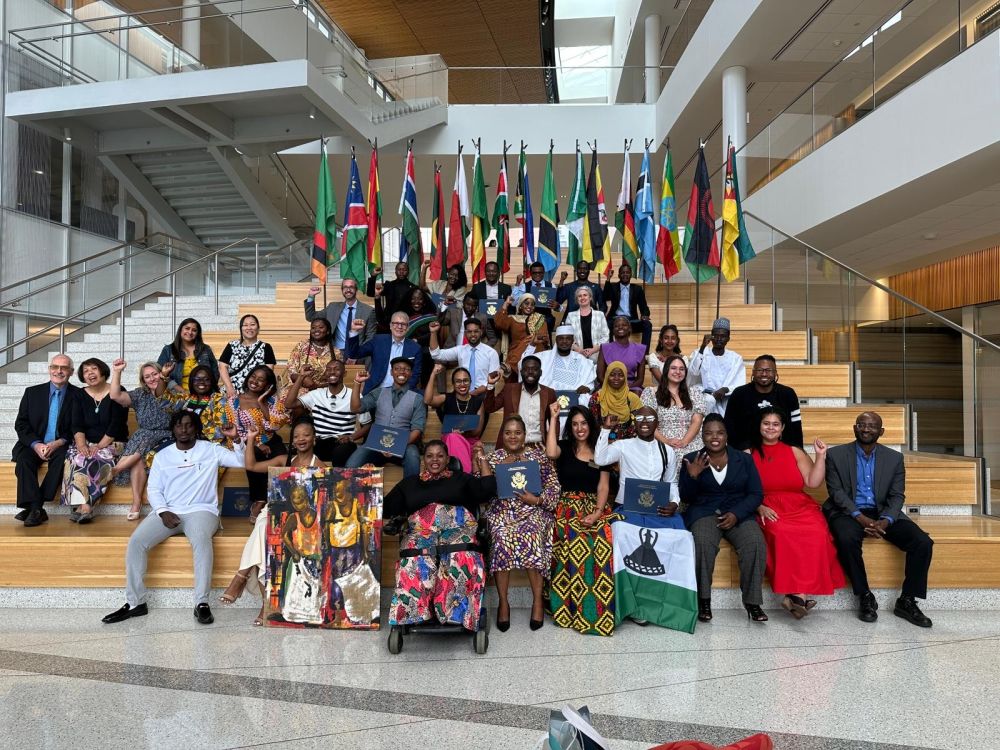
Mandela Washington Fellowship participants pause for a photo after completing the program.
In June of 2024, a steady arm accompanied Tsaone Mosweu as she approached a wooden lectern on the Blackbox Theatre stage in MSU’s Auditorium. One of her hands was gently placed on the lectern while the other was guided toward the microphone stand next to her. She took a moment to gauge her surroundings before addressing an audience of her peers.
Confidently she began, “I champion the principle of leaving no one behind.”
Mosweu, 28, is a young professional from Botswana living with blindness. She has dedicated her career to promoting reproductive health rights for young women with disabilities. She holds a bachelor’s degree in public health and is currently pursuing a master’s degree in sexual and reproductive rights.
“The harsh truth is that the rights of persons with disabilities are often overlooked, which reinforces a lack of self-confidence, self-respect, and an internalized belief that violence is acceptable,” she said. “As someone who has experienced firsthand the abuse, challenges, and barriers faced by persons with disabilities, I’m dedicated to creating meaningful change and empowering the next generation of young people to become active change makers. I ask that you join me in creating a better world for those who might otherwise be left behind.”
Sitting in the audience were leaders in environmental peacebuilding, experts in child and adolescent counseling, advocates for artistic expression and social justice, and many others dedicated to being catalysts of change.
“The fellowship was a moment of reflection and renewed commitment to wholeheartedly serve as a catalyst for change,” she said.
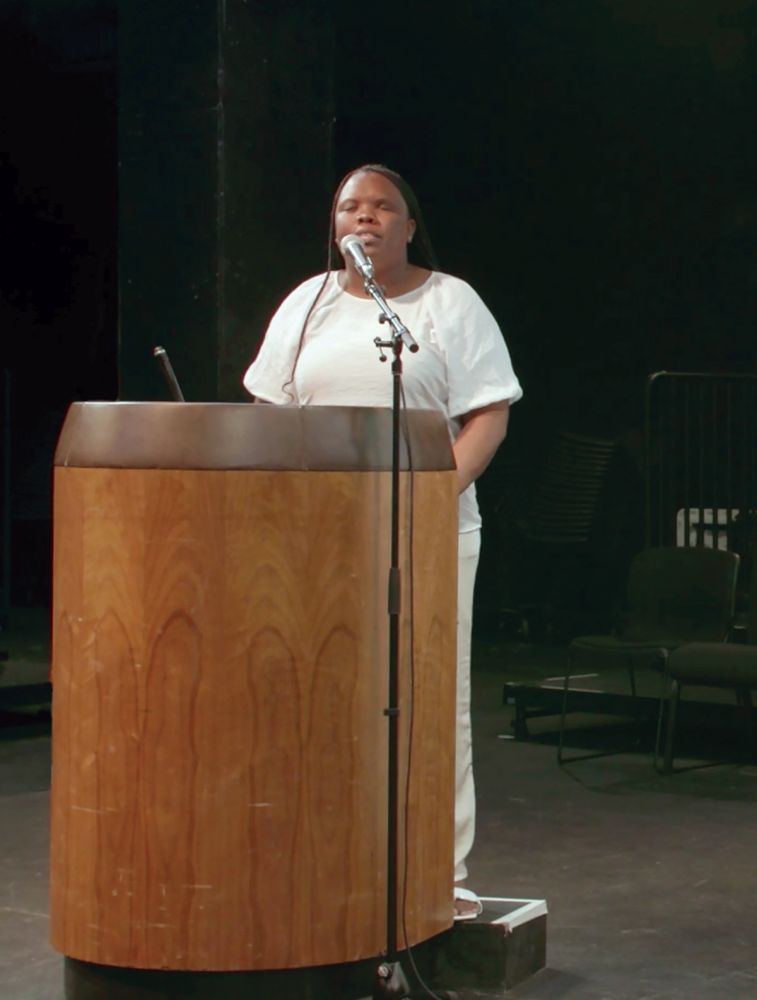
Mandela Washington Fellowship program participant Tsaone Mosweu delivers an “Ignite Talk” to an audience of her peers and the public during her time on MSU’s campus.
Still taken from video courtesy of MSU College of Arts & Letters
Mosweu and her peers represent some of the brightest young minds across sub-Saharan Africa. They have been internationally recognized for their innovation and leadership throughout their respective communities and countries.
Mosweu and her peers are Mandela Washington Fellows.
This year marks the third year of MSU hosting participants of the Mandela Washington Fellowship (MWF) program. The MWF is the flagship program of the Young African Leaders Initiative (YALI), an initiative of the United States Department of State established in 2010 by President Barack Obama to build stronger relationships between Africa and the United States. Since its inception in 2014, the MWF has provided young African leaders—ages 25 to 35—with opportunities to visit Leadership Institutes across the U.S. to collaborate with local citizens and leaders.
In February of 2024, Salah Hassan, professor and director of Global Studies in the Arts and Humanities in the College of Arts and Letters, announced MSU’s selection as a Leadership Institute of Civic Engagement for the Fellowship program. He would welcome 25 participants to campus just four months later.
Leadership Institute in Civic Engagement
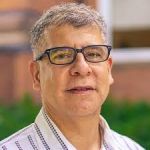
Salah Hassan
Serving as the program’s academic director, Hassan and his team collaborated with MSU’s Alliance for African Partnership and other campus and community partners to design a comprehensive agenda prior to the fellows’ arrival. The six-week agenda included activities meant to strengthen participants’ leadership skills and expand their knowledge of U.S. models of civic engagement. The agenda was framed around advocacy and accessibility and included five main components: academic programming; strength-based leadership training; networking activities; community service and site visits; and cultural and social activities.
In June of 2024, the fellows arrived on campus and spent their first week learning what the program would entail and discussing the basic principles of civic engagement.
Consecutive weeks focused on themes of democracy, government, foreign policy, and U.S.-African relations; youth empowerment and social justice advocacy; sustainable community development; and diversity, equity, inclusion, and accessibility. Participants attended workshops and lectures presented by university and community experts.
During the fourth week, Mosweu and her peers gave Ignite Talks to an audience of their peers and the public. These powerful speeches are on topics that relate to their professional work, personal experiences, and aspirations.
“These talks are presented by fellows who each have an amazing story to tell,” Hassan said. “It is rare we get this opportunity to hear young Africans speak in their own voices about their work and dreams.”
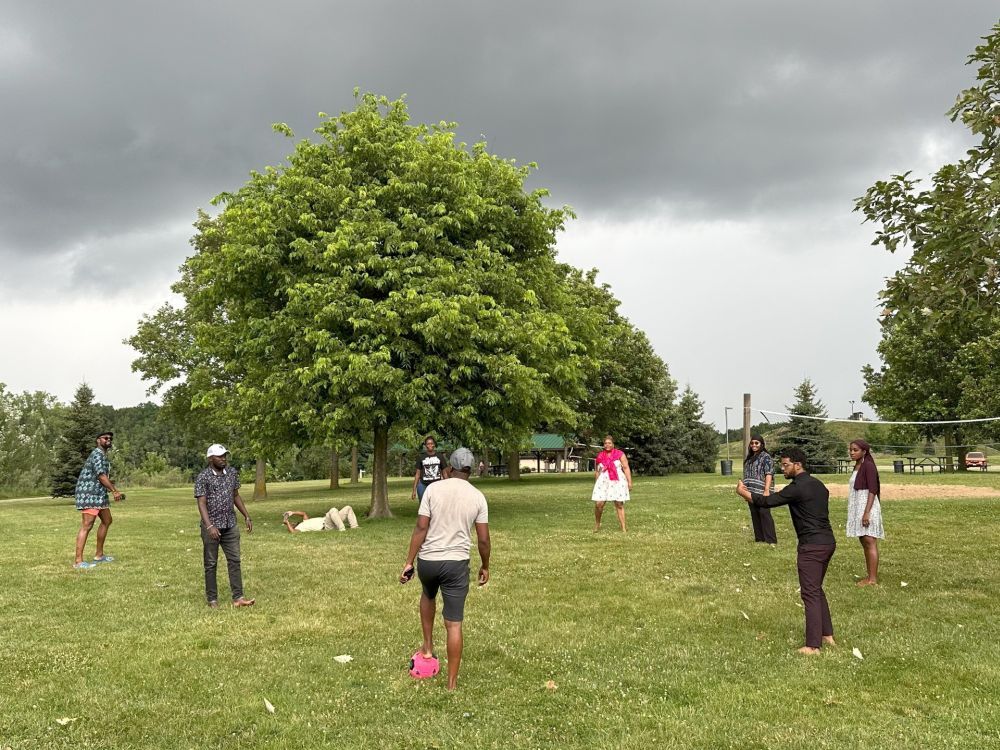
Fellows participated in a pick-up game of soccer during a site visit to Hawk Island Park in Lansing for a traditional potluck picnic and BBQ.
Local Impact
With civic engagement central to the program, community service activities were coordinated with local organizations to provide insight into the similarities and differences between U.S. and African approaches to local and large-scale societal issues, while also encouraging people from different backgrounds and interests to work together toward a common goal.
“While in the greater Lansing area, the fellows’ presence impacted the local social and cultural landscape as they participated in a wide range of activities on and off campus, meeting with local and state elected officials, attending community religious institutions, meeting with civic engagement organizations, and connecting with local families and students,” Hassan said.
The community service component allowed fellows to connect with groups committed to neighborhood revitalization, refugee development, resource conservation, youth empowerment, and racial justice advocacy. Local organizations, including the Justice League of Lansing, Peckham, the Women’s Center of Greater Lansing, and the Allen Neighborhood Center, were selected to provide learning opportunities that could be translated from one community to another.
“Each fellow volunteered 12 hours during their residency in the Lansing area to support community projects. During their site visits, fellows provided African-specific supports they use, contributing to the global perspective of what local community service means. It's not just about what we prepared, it’s about what they brought,” Hassan said.
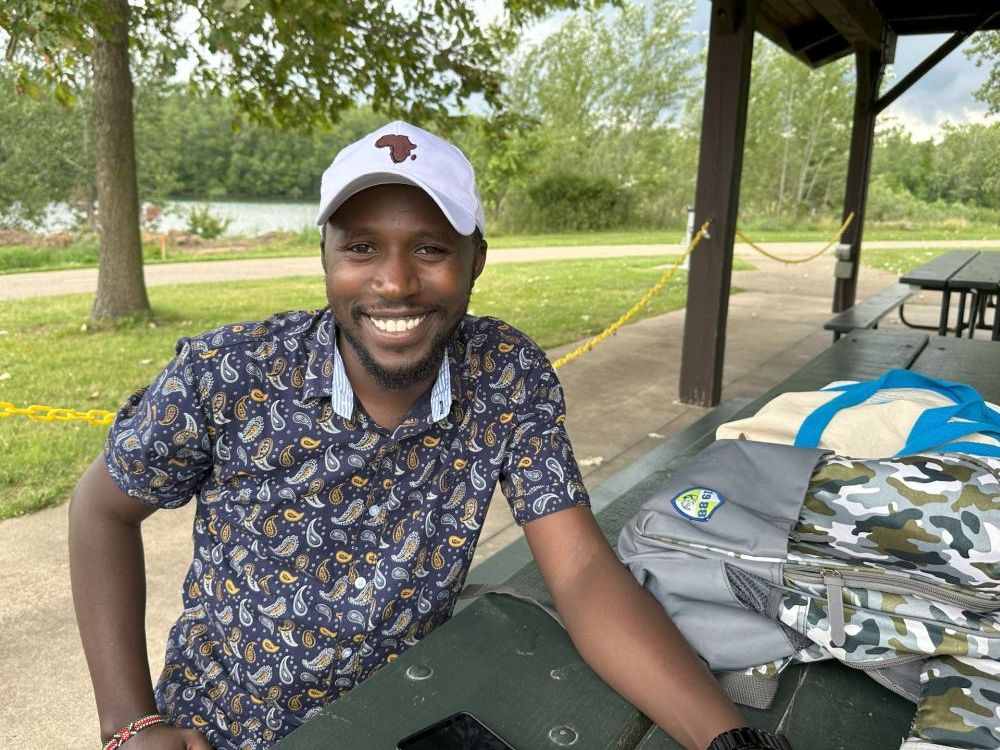
Pharis Jane, Mandela Washington Fellowship program participant, poses for a picture during a picnic at Hawk Island Park in Lansing.
One Fellow’s Journey
Pharis Jane was one of the visiting fellows from Kenya. He has a bachelor’s degree in engineering and a master’s degree in mechanical engineering, but he hasn’t sought out a future for himself in the engineering field. Instead, he serves as the national chairman for the Mt. Kenya College and Universities Students Association (M-CUSA), an organization dedicated to developing, nurturing, and empowering leaders of this generation to be influential in education and community development.
“Coming from humble beginnings paved the way for me to be who I am today,” Jane said. “My mother could not cater to all of my schooling needs with her earnings, so I worked on construction sites to earn money. I vowed that if I ever made it, I would dedicate my life to uplifting others and getting them off the block. I will stay in this to help others struggling to come up despite the challenges on the way.”
During the fellowship, Jane spent time at the Allen Neighborhood Center, which serves as a hub for neighborhood revitalization and activities that promote the health and well-being of Lansing’s Eastside community and other stakeholders. While there he was introduced to Tom Martin, program manager for the Hunter Park Garden House.
Martin led Jane and the other fellows on a tour of the gardens. He provided insight on pre-and-planting cycles and invited them to join in preparing large production beds with compost and planting soybeans for edamame. They also worked together to install an automated irrigation system.
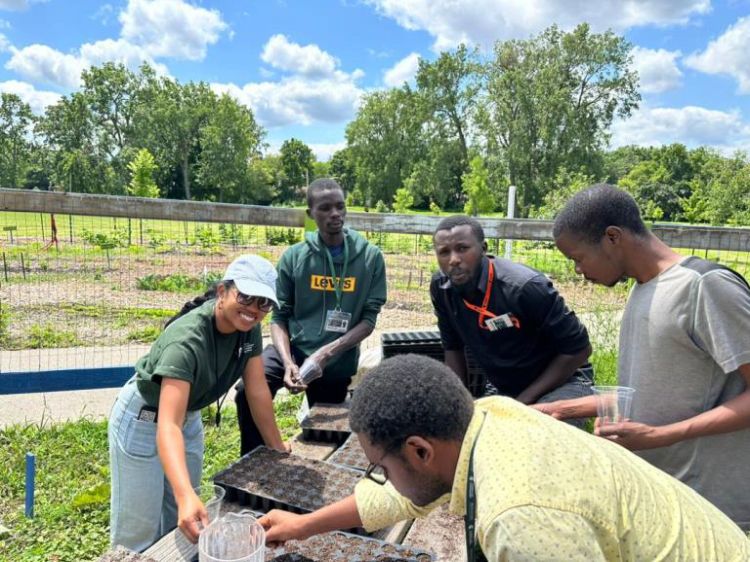
Pharis joins fellows in planting soybean seeds during their visit to the Allen Neighborhood Center.
“To be honest, I never expected people would be this welcoming,” Jane said of his time there. “But most importantly, I gained a different viewpoint of how to approach some of the challenges in my work back home. Being there affirmed that the work we are doing in Kenya, of giving back to the society that raised us, is being seen and is not in vain. I feel energized to do more and I look forward to rolling out different programs that will improve people’s lives.”
Martin saw value far beyond the fellows’ assistance in the garden. “Agriculture is a universal language, and that allowed me to personally get to know [the fellows]” he said. “I feel like I gained far more than they did from their time here, and I really valued the opportunity to learn about their cultural contexts related to agriculture and food production.”
Lasting Impacts
Jane was welcomed back to Kenya with enthusiasm from M-CUSA. In a recent article celebrating Jane’s return, the organization said, “We are proud of our chairman’s participation, and we believe that it will hugely complement his academic success. The skills and experiences gained through the Fellowship will enrich his leadership approach and strategic vision for M-CUSA. This achievement is a source of immense pride for all of us at M-CUSA. It signifies a bright future for our organization and reinforces the impact of dedicated leadership.”
The impact of the program lasts much longer than the six weeks fellows are on campus, Hassan said.
“The presence of 25 young leaders from Africa is felt across the campus, in East Lansing, and Lansing through the building of personal and professional relationships that persist after the fellows leave Michigan,” he said. “The communication between fellows, community partners, and MSU staff and students continues long after the formal program ends. In previous years, fellows have returned or planned to return to MSU for graduate studies, renewing and sustaining our historical campus connections with young scholars in Africa.”
- Written by Emily Springer, University Outreach and Engagement